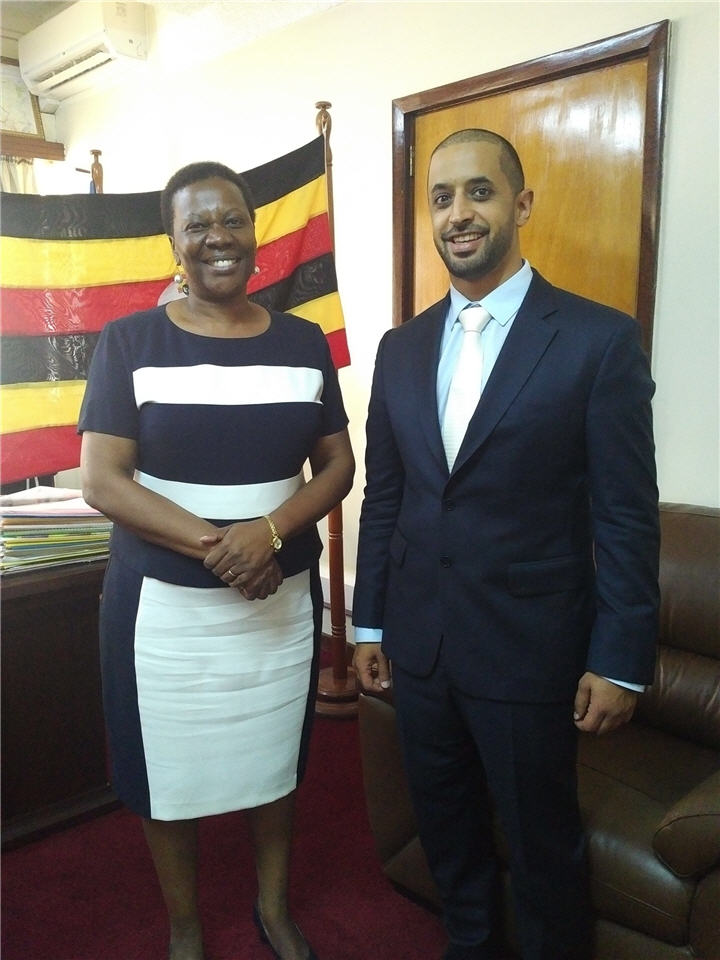UAE Kimberley Process Chair visits Uganda to garner support for the Global Initiative

The UAE Kimberley Process Chair (KP Chair), Ahmed Bin Sulayem, has visited Uganda as part of ongoing efforts towards increasing the dialogue with African countries around the rough diamond trade.
During his stay, Mr. Bin Sulayem held talks with Fred Kabagambe-Kaliisa, Permanent Secretary, Ministry of Energy and Mineral Development, Mbayo Esther Mbulakubuza, Minister for the Presidency (Office of the President), and Irene Muloni, Minister of Energy and Mineral Development.
As part of the mandate as KP Chair, Mr. Bin Sulayem visited Uganda in order to bring the country into discussions around the initiative should any large-scale diamond mining take place. It also centered on topics related to compliance protocols and border security, to ensure the processes were in place to prevent any illicit diamond trading activity across Uganda and to safeguard the interests of the country’s population.
Uganda is not yet a member of KP, but during meetings held with the KP Chair it has expressed interest in both KP membership, and in exploring a future in diamond mining beyond its existing mineral exports. UAE KP Chair, Ahmed Bin Sulayem, also extended an invitation to Uganda for the upcoming KP Plenary Meeting in Dubai, November 13-19, 2016.
According to World Bank data, 90% of mining in Uganda is done by artisanal, low-scale miners providing livelihoods for more than 200,000 individuals in a country where 19% of the total population struggles with poverty. While it does not mine rough diamonds on a large-scale at this time, there have been calls from the East Africa nation inviting international organisations to invest in this space.
“At its core, the Kimberley Process was founded to stem the flow of conflict diamonds, and it is most effective when it is a collaborative process,” said Bin Sulayem. “This is what we have sought to do with our Africa Initiative, as while we have made significant progress since the inception of the KP, it is vital that we continually look to bring more countries into the fold. This will ensure that any potential diamond mining activity takes place responsibly and that it benefits the local community in the source country in a sustainable fashion. We, along with the KP working committee, look forward to building on the progress of our discussions in Uganda and further enhancing discussions in the months to come.”
During the meetings in Uganda, Mr. Bin Sulayem also took the opportunity to discuss gold trade, and ways to combat what has become an unacceptable level of ‘unofficial’ gold trading.
Earlier this year, government ministers, regulators, mining industry professionals, security experts, airlines, logistics facilitators and representatives from the OECD gathered with DMCC for a workshop to discuss ways to combat hand-carried gold on airlines.
“Hand carried gold is not only costing governments’ billions of dollars a year in lost revenues, but it is severely impacting the lives of thousands of miners and supply chain operators through questionable employment, exploitation and transportation practices. We will be engaging actively with IATA and ICAO over the coming period and expect them to put regulations in place that can put a halt to hand-carriage of gold,” said Bin Sulayem in Uganda.
Launched earlier this year, the ‘Africa Initiative’ is a commitment by the KP Chair to keep a hands-on presence in diamond producing nations with the goal of facilitating KP compliance, fulfillment of KP mandates and to ensure Africa is equally represented in the diamond trade. Mr. Bin Sulayem, KP Chair, has already held successful meetings with CAR, Angola, South Africa, Burkina Faso, Democratic Republic of Congo, Ghana, Zimbabwe and Namibia this year. He will furthermore visit Rwanda, Burundi, and Mozambique.
About the Kimberley Process Certification Scheme
The Kimberley Process Certification Scheme is a collaborative initiative between governments, industry and civil society to stem the flow of conflict diamonds into the diamond trade. Started in 2000, the creation of the Kimberley Process Certification Scheme (KPCS) in November 2002 laid the foundation for the KPCS by setting out the requirements for controlling rough diamond production and trade. It entered into force in 2003, when participating countries started to implement the rules. There are now 54 participants representing 81 countries including the UAE.
In 2003, the UAE adapted its Federal Law “Union Law no.13 Regarding Supervision of Import/Export and Transit of Rough Diamonds” and became the first Arab country to implement the Kimberley Process Certification Scheme. The Kimberley Process office in DMCC is the entity authorised by the UAE Ministry of Economy to authenticate the ethical sourcing of rough diamonds traded in the country.
More News
Contract worker dies at Rio Tinto mine in Guinea
Last August, a contract worker died in an incident at the same mine.
February 15, 2026 | 09:20 am
{{ commodity.name }}
{{ post.title }}
{{ post.date }}




Comments